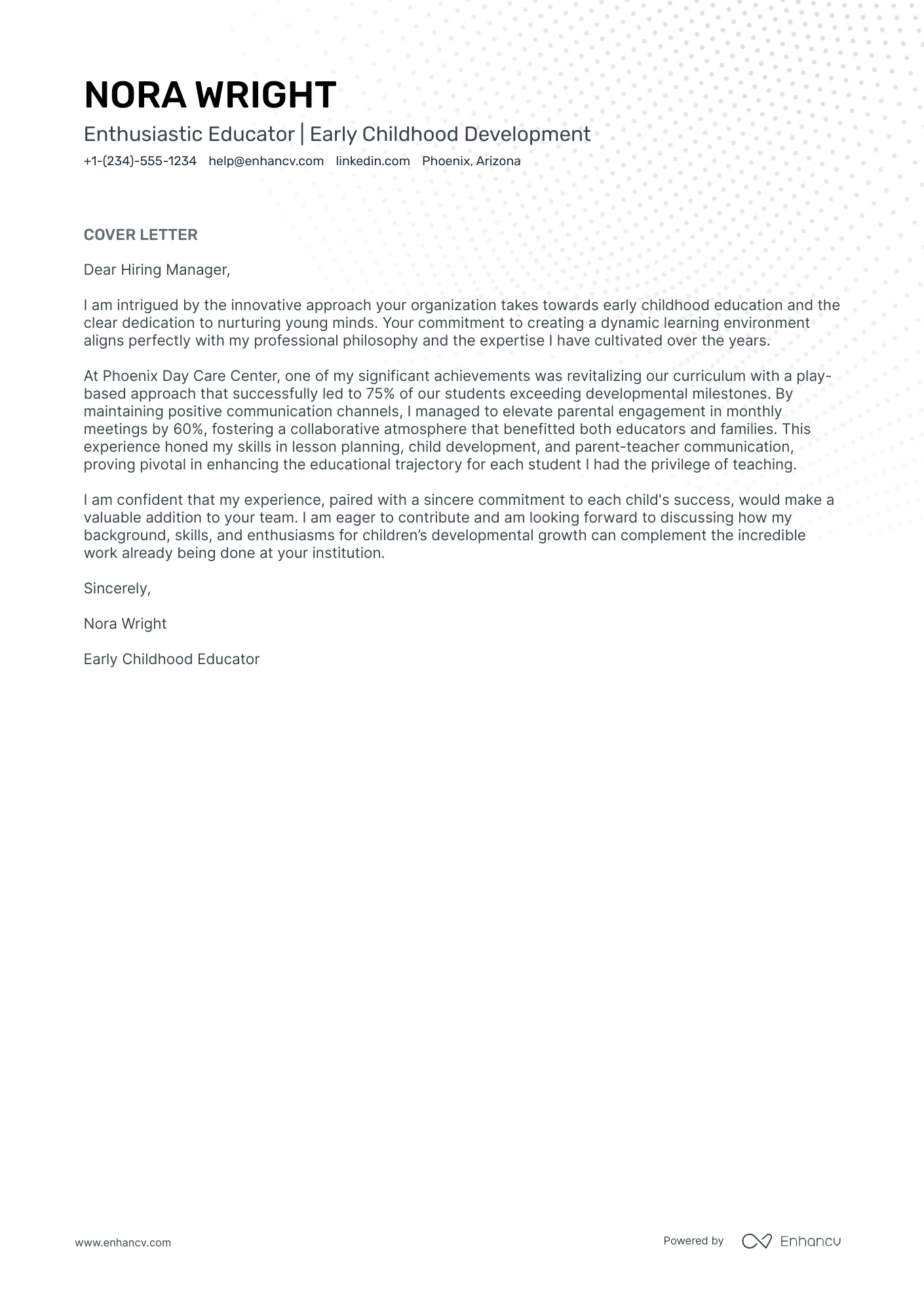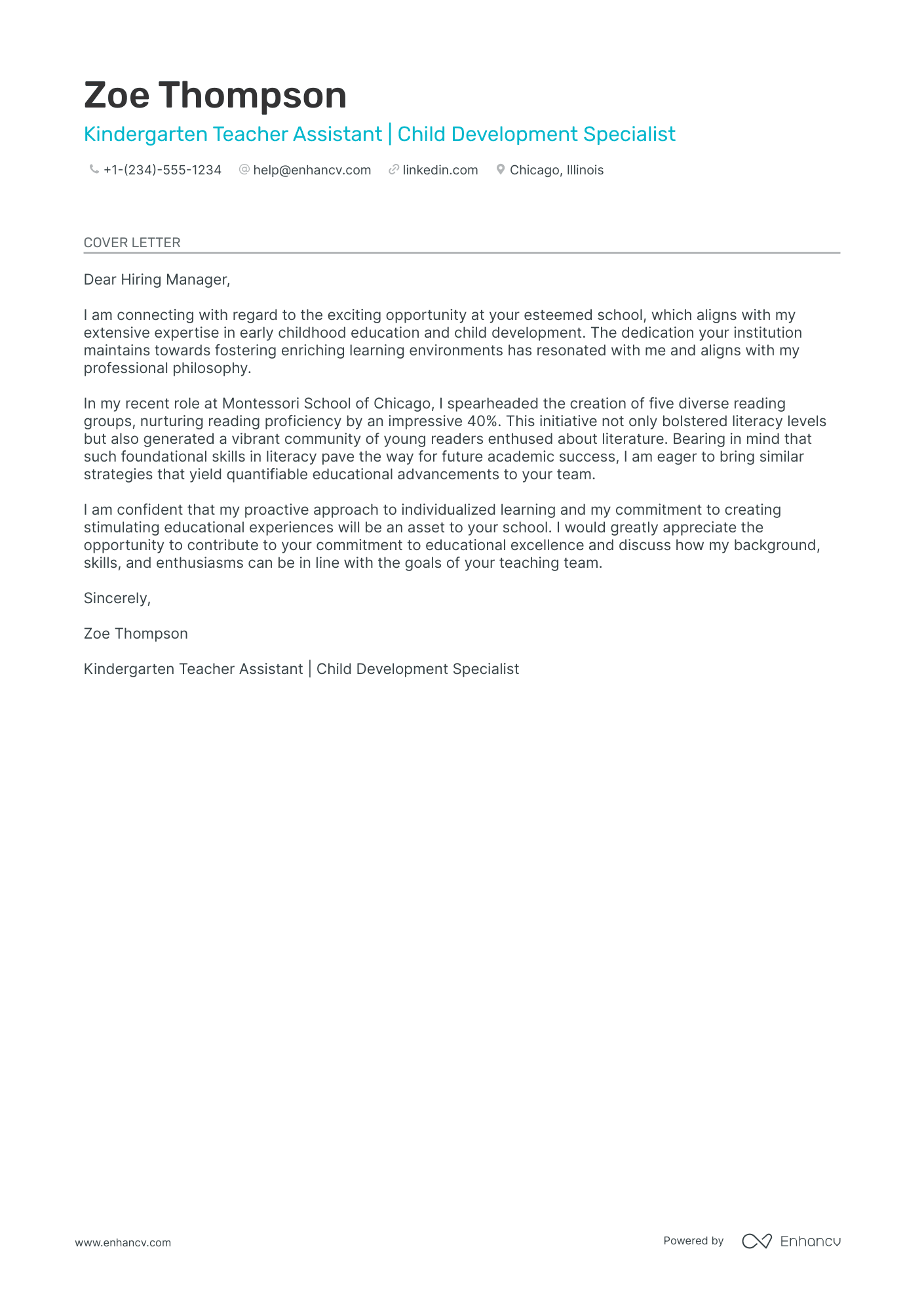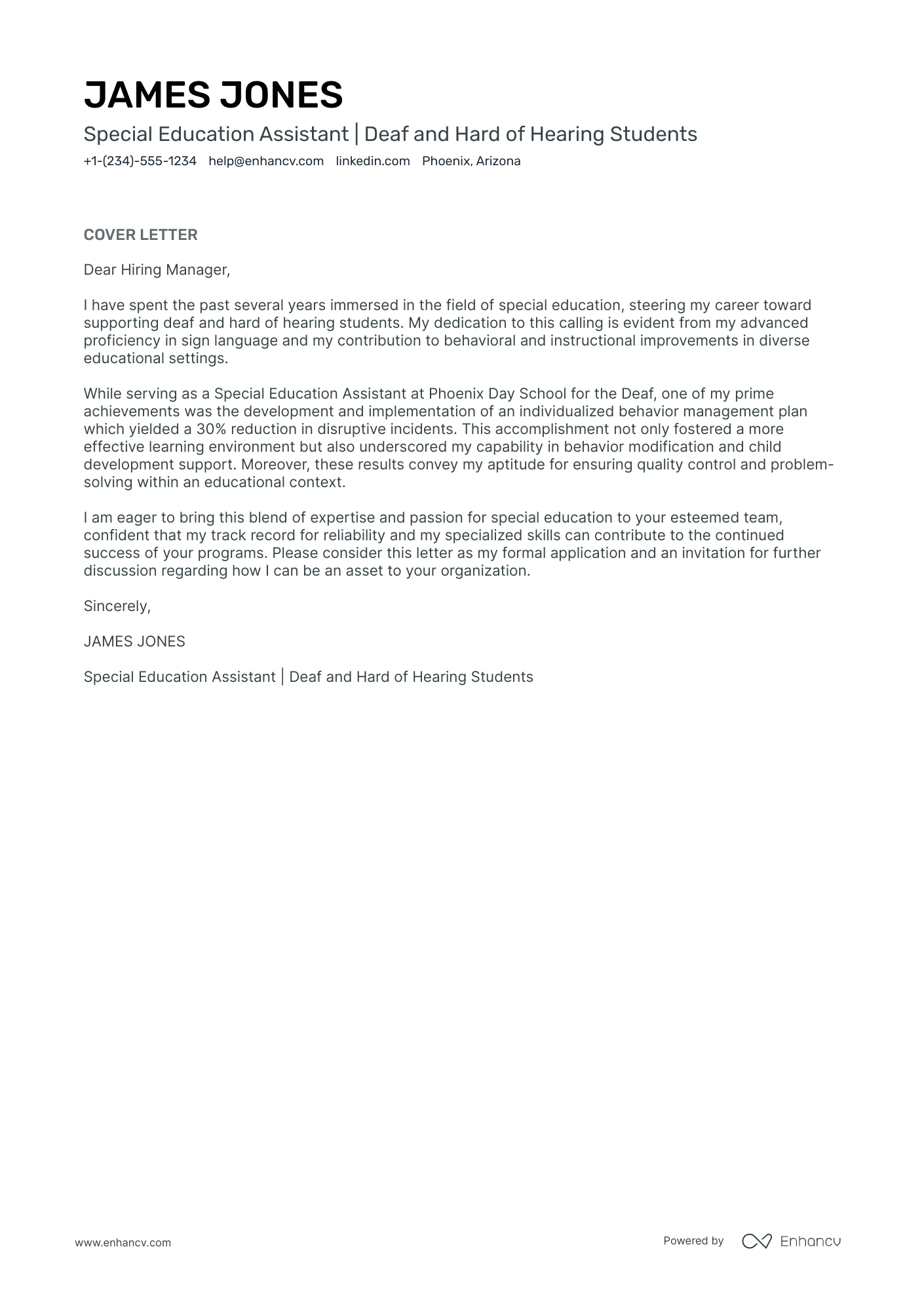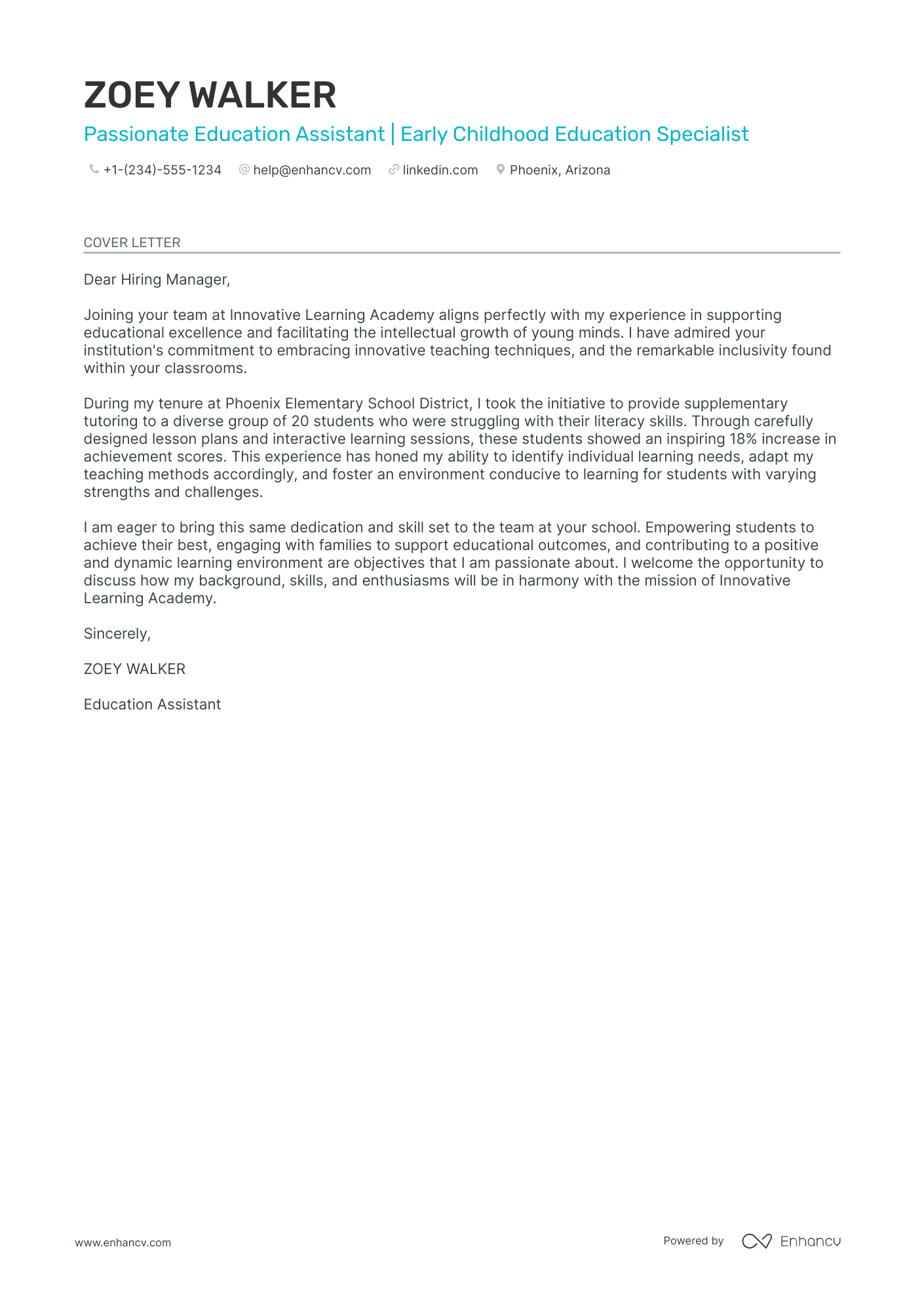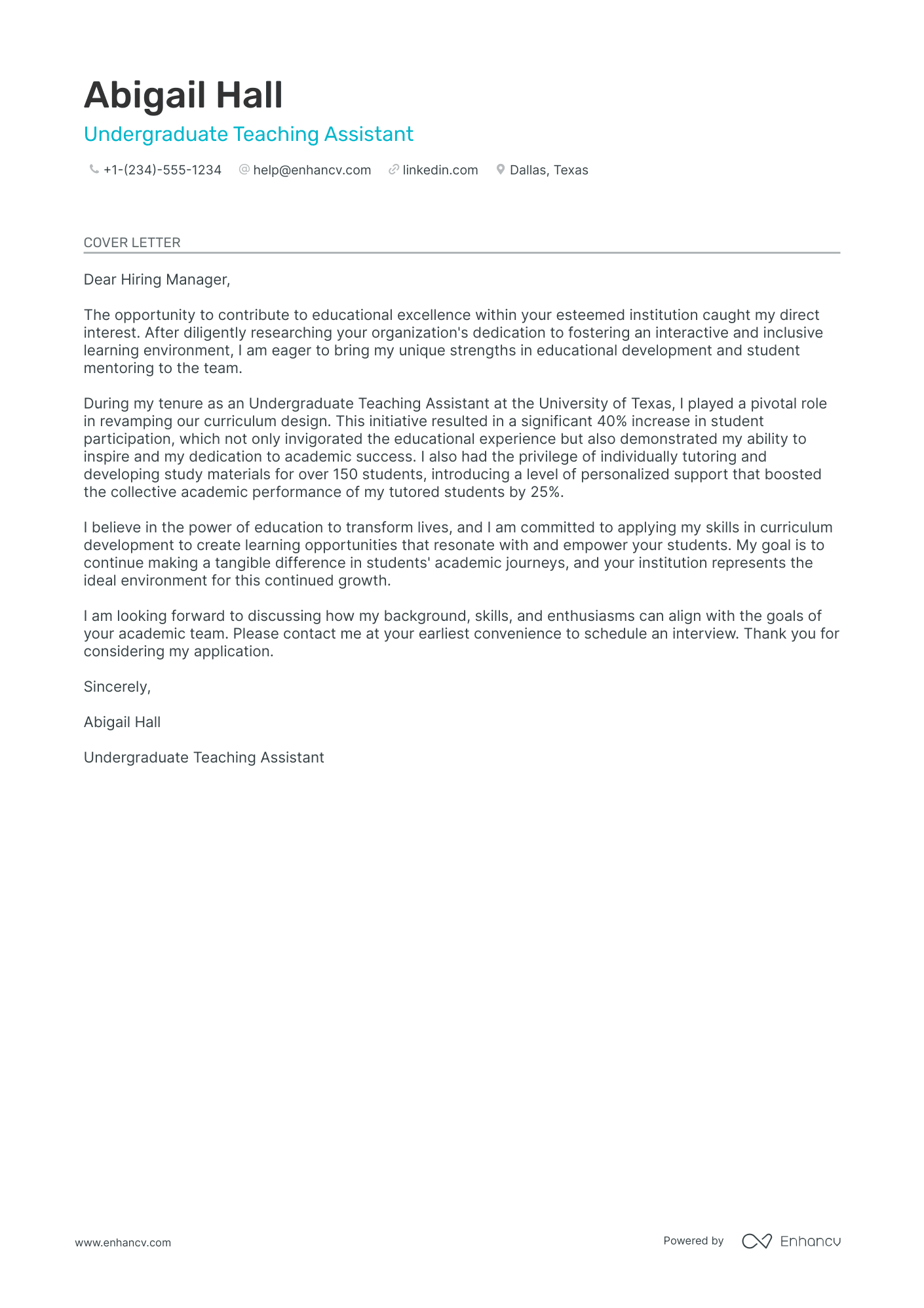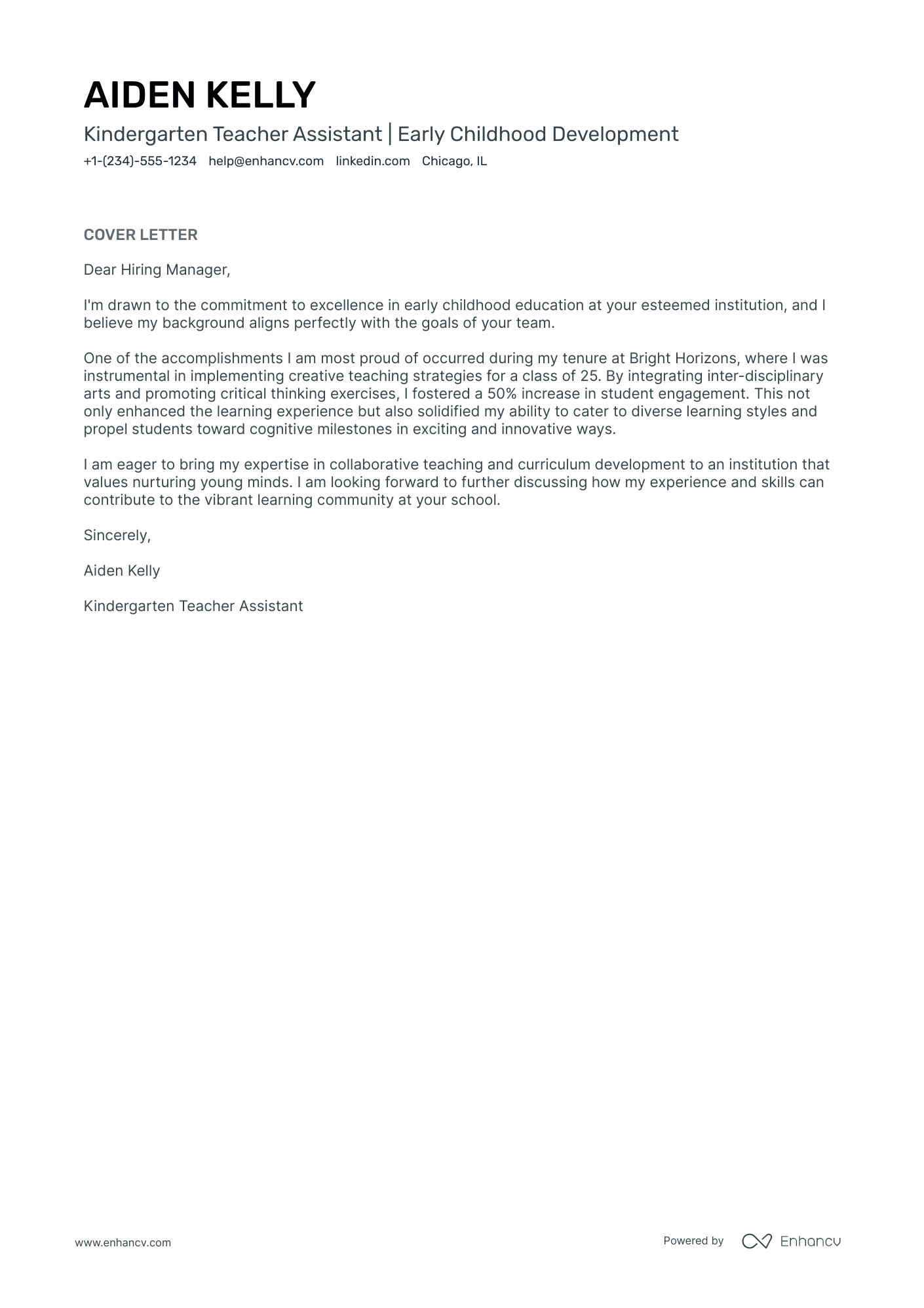Embarking on the journey to secure a teacher assistant position, you've probably hit the stumbling block of crafting the perfect cover letter. Unlike your resume, which lists your qualifications, your cover letter is your chance to narrate a singular professional triumph that you're exceptionally proud of. Striking the delicate balance between formality and originality, your cover letter must capture your unique contributions without echoing clichés or exceeding one page. Here's how to pen a compelling letter that stands out.
- Write a teacher assistant cover letter that helps you stand out (and get the job);
- Understand how to start and end your teacher assistant cover letter with the appropriate greeting;
- What to include in the body of your teacher assistant cover letter to put your best foot forward;
- Your most important achievements - how to present them as part of your teacher assistant cover letter.
And if you want to make your life even easier, simply drag and drop your teacher assistant resume into Enhancv's AI cover letter generator, and it will write your cover letter for you in just a few moments.
If the teacher assistant isn't exactly the one you're looking for we have a plethora of cover letter examples for jobs like this one:
Drop your resume here or choose a file.
PDF & DOCX only. Max 2MB file size.
Teacher assistant cover letter example
MARCUS HALL
Edmond, OK
+1-(234)-555-1234
help@enhancv.com
- Specific achievements in the field are highlighted, such as the implementation of innovative teaching tools that led to increased student engagement — providing concrete evidence of the candidate's impact on educational outcomes.
- Relevant experience is concisely mentioned to establish the candidate's qualifications, like their background in classroom management and curriculum development.
- The cover letter is tailored to the institution, showing the candidate has researched the school's values and is keen on contributing to those specific goals.
- An invitation to continue the conversation demonstrates proactiveness and openness to further discuss how the candidate can contribute to the team, effectively prompting the next step in the hiring process.
Designing your teacher assistant cover letter: what is the best format
Let's start with the basics, your teacher assistant cover letter should include your:
- Header
- Greeting
- Introduction
- Body paragraph
- Closing statement
- Signature (that's not a must)
Next, we'll move to the spacing of your teacher assistant cover letter, and yes, it should be single-spaced (automatically formatted for you in our cover letter templates).
Don't go for a old-school font (e.g. Arial or Times New Roman), but instead, pick an ATS-favorite like Chivo, Volkhov, or Raleway, to stand out.
Our cover letter builder is also set up for you with the standard one-inch margin, all around the text.
Finally, ensure your teacher assistant resume and cover letter are in the same font and are submitted in PDF (to keep the formatting in place).
P.S. The Applicant Tracker System (or ATS) won't be assessing your [job] cover letter, it's solely for the recruiters' eyes.
Why spend hours writing a cover letter? Our free cover letter generator can do it for you in seconds.
The top sections on a teacher assistant cover letter
- Header: Include your contact information, date, and employer details to ensure the recruiter can easily identify and follow up with you; this aligns with professional standards for any formal application letter.
- Greeting: Address the hiring manager or school principal directly if possible, since personalizing your cover letter shows attention to detail and respect for the school's administrative structure.
- Introduction: Briefly articulate your enthusiasm for the teaching assistant role and any relevant teaching philosophy, as this shows your genuine interest in supporting education and matching the school's ethos.
- Body: Highlight your relevant experiences, skills in classroom management, and any specialized knowledge pertinent to the curriculum or student needs, as this demonstrates your capability to assist in the educational process effectively.
- Closing: End with a reaffirmation of your interest in the position, a statement of appreciation for considering your application, and a call to action, such as looking forward to an interview, which suggests your eagerness to engage further with the school community.
Key qualities recruiters search for in a candidate’s cover letter
- Experience in a classroom setting: Demonstrates familiarity with the educational environment and the ability to assist the lead teacher in daily tasks.
- Communication skills: Essential for effectively interacting with students, teachers, and parents, as well as for conveying information clearly and supportively.
- Patience and adaptability: Deals with varying learning paces and styles among students while maintaining a calm, supportive classroom atmosphere.
- Knowledge of educational technology: Proficiency with tools like interactive whiteboards and educational software to enhance learning experiences.
- Classroom management skills: Ability to help maintain order, focus, and discipline, ensuring a conducive learning environment.
- Passion for education and development: Shows dedication and enthusiasm for student growth, which can inspire and motivate children to learn.
What greeting should you use in your teacher assistant cover letter salutation
A simple "Hello" or "Hey" just won't work.
With your teacher assistant cover letter salutation, you set the tone of the whole communication.
You should thus address the hiring managers by using their first (or last name) in your greeting.
But how do you find out who's recruiting for the role?
The easiest way is to look up the role on LinkedIn or the corporate website.
Alternatively, you could also contact the organization via social media or email, for more information.
Unable to still obtain the recruiter's name?
Don't go down the "To whom it may concern path". Instead, start your cover letter with a "Dear HR team".
List of salutations you can use
- Dear [Name of Hiring Manager],
- Dear [Name of Principal],
- Dear [Name of Superintendent],
- Dear [Name of School Committee Member],
- Dear Hiring Committee,
- Dear [Name of Academic Director],
First introductions in your teacher assistant cover letter
Within your teacher assistant cover letter introduction, genuinely state what you like about the organization.
Research the latest company projects, honorary awards, company updates, etc.
Write up to two sentences to let recruiters know what impresses you about the company,
This would help you to set a good tone for the rest of the communication.
How to write an achievement-focused teacher assistant cover letter body
We've got the intro and greeting covered. Now, comes the most definitive part of your teacher assistant cover letter - the body.
In the next three to six paragraphs, you'd have to answer why should recruiters hire you.
What better way to do this than by storytelling?
And, no, you don't need a "Once upon a time" or "I started from the bottom and made it to the top" career-climbing format to tell a compelling narrative.
Instead, select up to three most relevant skills for the job and look back on your resume.
Find an achievement, that you're proud of, which has taught you these three job-crucial skills.
Quantify your accomplishment, using metrics, and be succinct in the way you describe it.
The ultimate aim would be to show recruiters how this particular success has built up your experience to become an invaluable candidate.
A sincere and original way to end your teacher assistant cover letter
When writing their teacher assistant cover letter, candidates tend to use one of these phrases, "Sincerely yours" or "I look forward to hearing from you".
Both statements show good manners, but your cover letter should end in a more actionable manner.
Write about:
- how you see yourself growing in the role/organization;
- the benefits you would bring about (you'd impress even more with tangible metrics);
- the next steps in the process (provide your availability for interviews).
Keep this in mind when writing your zero experience teacher assistant cover letter
Even though you may not have any professional experience, your teacher assistant cover letter should focus on your value.
As a candidate for the particular role, what sort of skills do you bring about? Perhaps you're an apt leader and communicator, or have the ability to analyze situations from different perspectives.
Select one key achievement from your life, outside work, and narrate a story that sells your abilities in the best light.
If you really can't think of any relevant success, you could also paint the picture of how you see your professional future developing in the next five years, as part of the company.
Key takeaways
Creating your teacher assistant cover letter should be a personalized experience for the role and the recruiter, where you:
- Format your cover letter using the same ATS-friendly font (e.g. Railway) as you did for your resume;
- Greet recruiters, using their name, and follow up with two sentences to introduce yourself, your interest in the role, and to stand out;
- Map out one key success from your career (or life) that has taught you job-crucial skills;
- Substitute your lack of experience with an achievement from your internships, degrees, or volunteering gigs;
- End with a promise for your potential or your availability for an interview.
Teacher Assistant cover letter examples
By Role
